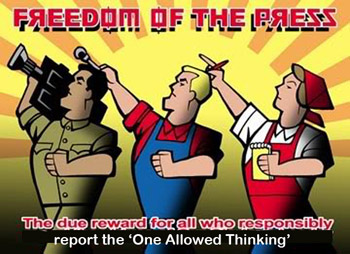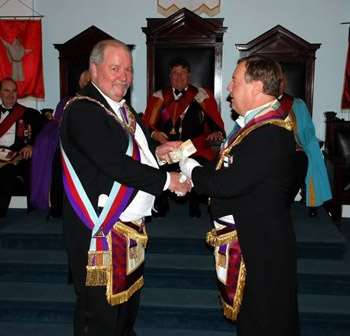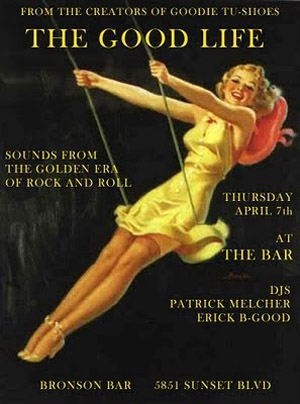Faith under Attack
 |
 |
 |
 |
 |
 |
 |
Progressivist Strategy - Part VI
Freedom of Press, Winners-Losers
& Enjoyment of Life
Continuing this series (see parts one, two, three, four and five) we look at three more myths of the ‘only allowed thinking’ advanced by Progressivism.
15. The press must be free, without censorship. It must not be censored even when it encourages concupiscence, resentment, class hatred, historical falsehoods, defamation or any other bad tendency considered censurable by Catholic Morals.
The hypocritical promoters of the “only allowed thinking” call for freedom of the press not only “when it encourages concupiscence, etc …” – but because it fosters all this and only to the extent it does so. Those who defend Catholicism or simply natural truth have no possibility of publishing their works in the mainstream press. They suffer a shameless blatant censorship, exercised in the name of the “freedom of the enterprise.”
 Besides the daily silence that I experience from the press, I recall that when I founded the Party of Order and Justice, the media never published any news report on our political campaign. I made a suit against them for the violation of the principle of “freedom of the press” contained in our Constitution.
Besides the daily silence that I experience from the press, I recall that when I founded the Party of Order and Justice, the media never published any news report on our political campaign. I made a suit against them for the violation of the principle of “freedom of the press” contained in our Constitution.
The defense lawyers based themselves in turn on “freedom of the enterprise.” Their argument basically was: “We own the newspapers and we can publish whatever we want based on freedom of the enterprise.” Needless to say, they won the suit.
Pope Gregory XVI affirms in his Encyclical Mirari vos:
“Here We must deal with that harmful and never sufficiently condemned freedom of the press that allows liberty to publish any writings whatever and disseminate them among the people, which some dare to demand and promote with a great clamor. We are horrified to see what monstrous doctrines and prodigious errors are disseminated far and wide in countless books, pamphlets and other writings, which, though small in weight, are very great in malice. We see with sorrow the abuse that proceeds from them spread over the face of the earth.” (n. 15)
If the Pope could say this in 1832, the year of his Encyclical, what should we say today, when that same plague has multiplied to infinity, as has the conspiracy of silence that weighs like a tombstone over good writings?
16. The winners, those who are successful in business, politics, social life and sports are models held up for society, even if their behavior is morally reprehensible. The losers, those without power or publicity, are paid no attention, even if they are morally good.
The truth is that success in business and other fields is often not based just on the qualities of the man, but principally on the favor he enjoys from the establishment powers. Rather than depending on merit, success relies on one’s submission to the “only allowed thinking,” which will bestow him money, fame and prestige. Those who are aware of this dependence and enter some secret society that promotes this thinking come closer to that coveted success.
 On the other hand, the “losers” are so, not principally because they are inept, but because they do not submit to the power of the “only allowed thinking,” which is established everywhere in politics, business, the press and entertainment industry, and even in the ecclesiastical milieu.
On the other hand, the “losers” are so, not principally because they are inept, but because they do not submit to the power of the “only allowed thinking,” which is established everywhere in politics, business, the press and entertainment industry, and even in the ecclesiastical milieu.
Ambitious youth – who either lack true Catholic formation or are unfaithful to it – do not adopt as their models the “losers,” even when they are virtuous, but rather the “winners,” and they try to imitate them in everything. This includes their adhesion to the “only allowed thinking” and their immorality. For they inherently sense that their “successes” are not purely the consequence of their own capacity but that slavish adhesion.
There are Catholics “winners” who appear to be virtuous. They may practice some moral virtues, but certainly they are not duly faithful to Catholicism without the stain of Modernism-Progressivism. Instead, they practice a Catholicism that is in tune with the progressivist errors that dominate in the clergy. Now then, given the enormous power of the clergy, this opens to them the door to success.
17. Life is the most precious thing on earth. Nothing is above life, because there is no after-life, or, at least, an after-life is not as certain as the life we have now. To enjoy life is the best way to live.
Earthly life is not the most precious gift because it is transitory; what is most important is the salvation of the soul, which is perpetual. To deny that there is a Heaven and Hell is the starting point of all crimes and vile wrongdoings of our days.
 If, after denying them, someone still has something “good” – as can be the case of some atheists, so praised by the progressivists – it is by chance or the fruit of some good formation received as a child. However, as soon as some difficulty or seductive temptation appears, he generally sets aside the remains of that goodness and goes astray.
If, after denying them, someone still has something “good” – as can be the case of some atheists, so praised by the progressivists – it is by chance or the fruit of some good formation received as a child. However, as soon as some difficulty or seductive temptation appears, he generally sets aside the remains of that goodness and goes astray.
What the “only allowed thinking” considers as “enjoying life” is to adopt a deformed morals – or no morals at all.
The modernist-progressivists are never tired of preaching that the Catholic must be joyful, always happy, as if he were living in the best of all possible worlds. Traditional Catholic doctrine teaches us, instead, that we live in a valley of tears. This healthy position is denigrated and despised as a type of pathological melancholy that resulted precisely from the good Catholic doctrine.
The truth is otherwise. The joy of the Catholic is never the worldly, carefree and bouncy “enjoyment of life,” but the firm, serene confidence that God’s mercy will open the gates of Heaven to us. This is the virtue of Hope.
The modernist-progressivists say that “a sad saint is a poor saint,” as if the worldly “joy of life” were a condition of sanctity. It is obvious that the saint can be joyful insofar as it is understood under the light of Hope.
Continued

The hypocritical promoters of the “only allowed thinking” call for freedom of the press not only “when it encourages concupiscence, etc …” – but because it fosters all this and only to the extent it does so. Those who defend Catholicism or simply natural truth have no possibility of publishing their works in the mainstream press. They suffer a shameless blatant censorship, exercised in the name of the “freedom of the enterprise.”

The defense lawyers based themselves in turn on “freedom of the enterprise.” Their argument basically was: “We own the newspapers and we can publish whatever we want based on freedom of the enterprise.” Needless to say, they won the suit.
Pope Gregory XVI affirms in his Encyclical Mirari vos:
“Here We must deal with that harmful and never sufficiently condemned freedom of the press that allows liberty to publish any writings whatever and disseminate them among the people, which some dare to demand and promote with a great clamor. We are horrified to see what monstrous doctrines and prodigious errors are disseminated far and wide in countless books, pamphlets and other writings, which, though small in weight, are very great in malice. We see with sorrow the abuse that proceeds from them spread over the face of the earth.” (n. 15)
If the Pope could say this in 1832, the year of his Encyclical, what should we say today, when that same plague has multiplied to infinity, as has the conspiracy of silence that weighs like a tombstone over good writings?
16. The winners, those who are successful in business, politics, social life and sports are models held up for society, even if their behavior is morally reprehensible. The losers, those without power or publicity, are paid no attention, even if they are morally good.
The truth is that success in business and other fields is often not based just on the qualities of the man, but principally on the favor he enjoys from the establishment powers. Rather than depending on merit, success relies on one’s submission to the “only allowed thinking,” which will bestow him money, fame and prestige. Those who are aware of this dependence and enter some secret society that promotes this thinking come closer to that coveted success.

Often the favors of the Masonic Lodge are behind the 'winners' of modern society
Ambitious youth – who either lack true Catholic formation or are unfaithful to it – do not adopt as their models the “losers,” even when they are virtuous, but rather the “winners,” and they try to imitate them in everything. This includes their adhesion to the “only allowed thinking” and their immorality. For they inherently sense that their “successes” are not purely the consequence of their own capacity but that slavish adhesion.
There are Catholics “winners” who appear to be virtuous. They may practice some moral virtues, but certainly they are not duly faithful to Catholicism without the stain of Modernism-Progressivism. Instead, they practice a Catholicism that is in tune with the progressivist errors that dominate in the clergy. Now then, given the enormous power of the clergy, this opens to them the door to success.
17. Life is the most precious thing on earth. Nothing is above life, because there is no after-life, or, at least, an after-life is not as certain as the life we have now. To enjoy life is the best way to live.
Earthly life is not the most precious gift because it is transitory; what is most important is the salvation of the soul, which is perpetual. To deny that there is a Heaven and Hell is the starting point of all crimes and vile wrongdoings of our days.

The modern myth: happiness is the aim of life to be achieved by all
What the “only allowed thinking” considers as “enjoying life” is to adopt a deformed morals – or no morals at all.
The modernist-progressivists are never tired of preaching that the Catholic must be joyful, always happy, as if he were living in the best of all possible worlds. Traditional Catholic doctrine teaches us, instead, that we live in a valley of tears. This healthy position is denigrated and despised as a type of pathological melancholy that resulted precisely from the good Catholic doctrine.
The truth is otherwise. The joy of the Catholic is never the worldly, carefree and bouncy “enjoyment of life,” but the firm, serene confidence that God’s mercy will open the gates of Heaven to us. This is the virtue of Hope.
The modernist-progressivists say that “a sad saint is a poor saint,” as if the worldly “joy of life” were a condition of sanctity. It is obvious that the saint can be joyful insofar as it is understood under the light of Hope.
Continued

Posted July 2, 2014
______________________
______________________











